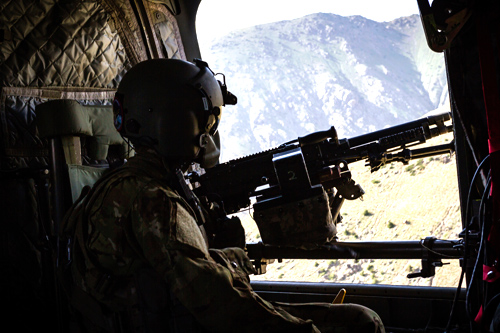
WASHINGTON—House Speaker Paul Ryan stopped California Democratic Rep. Barbara Lee from forcing lawmakers to debate U.S. wars, but Senate Majority Leader Mitch McConnell couldn’t stop Kentucky Republican Sen. Rand Paul from doing the same thing.
But while Paul got the debate, he didn’t get the votes. Senators defeated his plan to yank the current – and 16-year-old – Authorization to Use Military Force, which allegedly justifies the wars, and order the Trump administration to draft a new one. Paul lost, 61-36.
Paul, a self-styled libertarian and one-time GOP presidential hopeful, threatened to tie the Senate up in knots unless McConnell, the majority leader, allowed four hours of debate on the AUMF, which three presidents have used to send U.S. troops in Afghanistan and Iraq. McConnell threw in the towel late in the evening of Sept. 11.
As a result, Paul controlled the debate on Sept. 12 during Senate consideration of the annual Defense Department authorization bill. But he didn’t convince most of his colleagues: Paul and only one other Republican, Utah’s Mike Lee, both independents and 32 Democrats voted to end the AUMF.

To get that debate and vote, Paul made it clear he would stall the Senate’s defense bill unless senators truly debated why thousands of U.S. troops are still in Afghanistan and Iraq. Paul wants them out. In a tweet, he vowed to oppose “all procedural motions and amendments unless and until my amendment” to repeal the AUMF “is made in order and we vote on these wars.” He had stalled the bill when it first came up on July 16.
“I will continue to fight, and if necessary, object, to continue this debate, secure a vote and force Congress to do its duty,” he tweeted.
Paul declared later that McConnell gave in: “Senate leaders have agreed not to try to end debate early, and have agreed to four hours of debate under my control to debate these wars.”
The anti-war amendment is not Paul’s only joust with fellow Republicans over military matters. He is also offering an amendment to end DOD’s distribution of surplus offensive military equipment—such as militarized trucks—to local police. His plan also calls for police to return the offensive equipment they’ve already received. Police could keep defensive equipment, like body armor.
Militarization of the police is a top issue with U.S. minorities, who are often victims of unjustified police attacks, racism, and shootings. Demilitarizing police is a key cause of some African-American groups.
And Paul isn’t the only senator using the defense bill debate to counter Trump and the GOP. Sens. Susan Collins, R-Maine, and Kirsten GillIbrand, D-N.Y., planned an amendment overturning Trump’s ejection of transgender people from the military.
McConnell’s yielding to Paul on the AUMF is a direct contrast to what happened in the U.S. House earlier this year. Then, Rep. Lee, the sole lawmaker in either House of Congress to vote against the AUMF in 2001, convinced a key committee to put AUMF repeal in a defense bill.
That would have opened a true debate on the wars. But Ryan, after a heated discussion with Lee on the House floor, ordered colleagues to yank it. Both Paul and Lee have been sharp critics of the AUMF, and the wars, for years, and have tried unsuccessfully for such debates before.
Paul bluntly said it’s time to get out—a view shared by many.
“The Trump administration is increasing the number of troops in Afghanistan and, by doing so, keeping us involved even longer in a 16-year-old war that has long since gone past its time. The mission in Afghanistan has lost its purpose, and I think it is a terrible idea to send any more troops into that war. It’s time to come home now,” he said in a statement in mid-August.
Congress passed the AUMF after the Sept. 11, 2001 al-Qaeda attacks on New York and Washington that killed almost 3,000 people. Paul said had he been in the Senate then, he would have voted for the AUMF. That’s because its mission was well-defined, against al-Qaeda and the sponsoring Taliban Afghan government.
“But as is typical, there was significant mission creep in Afghanistan. We went from striking back against those who attacked us, to regime change, to nation-building, to policing their country for them. And we do it all now with an authorization that is flimsy at best, with the reason blurred, and the costs now known.
“We do it with an authorization that was debated and passed before some of our newest military personnel were out of diapers. This isn’t fair to them, to the American people, or to a rational foreign policy.
“The Afghanistan war going beyond its original mission has an enormous cost.”
Paul also said the AUMF shows how Congress has dumped its responsibility to declare wars, as the U.S. Constitution mandates. He said he’ll insist his colleagues debate that, too.
“If the president and my colleagues want to continue the war in Afghanistan, then at the very least Congress should vote on it. I’ll insist they do this fall, and I’ll be leading the charge for ‘no,’” he wrote.
Updated by the author September 14, 10 a.m.










